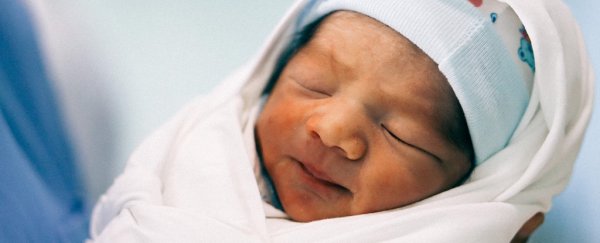Infants born at home may have more diverse gut bacteria, a new study has found. This difference could have an impact on a growing person's immunity and metabolism, so we ought to pay attention.
When a baby enters the world for the first time, they are rapidly colonised by microbes, including trillions of bacteria, fungi and viruses that keenly take up residence in and on the body.
These invisible passengers are what make up the human microbiome, and those in the gut are thought to play a particularly important role in digestion and the immune system.
But there's still a bunch that we don't know about the human microbiome, including how it is established and how it changes over time.
Some researchers have suggested that an overly clean environment in early life - such as a sterile hospital - can adversely affect a child's development.
So far, however, most studies have been confined to the hospital, and it's still unclear what role the birthing environment might actually play in the establishment of one's microbiome.
To figure this out, the new study followed 35 infants and their mothers for a month after birth. While 14 infants were born at home and 21 in the hospital, every single child was delivered vaginally and exclusively breastfed after birth - two important ways that a mother can pass on her microbes.
In addition, none of the mothers were treated with antibiotics and all of them had immediate skin-to-skin contact with their babies, breastfeeding shortly after birth.
Throughout the month, the researchers periodically collected vaginal swab and faeces samples from the mothers, along with poop samples from the babies as well.
Compared to the babies born at home, the findings reveal that hospital-born infants had a lower diversity of gut flora, and this change persisted for the entire month.
"The reasons for the differences between infants born at home versus in hospitals are not known, but we speculate that common hospital interventions like early infant bathing and antibiotic eye prophylaxis or environmental factors - like the aseptic environment of the hospital - may be involved," says senior author Maria Gloria Dominguez-Bello, a researcher in microbiota function at Rutgers University-New Brunswick.
These results suggest that babies born in hospitals are immediately exposed to less microbes and, therefore, have less diverse microbiomes in the first month of life.
But let's be clear: while antibiotics, formula feeding, caesarian sections and now hospital births have all been found to change the makeup of an infant's microbiome, it's still not clear if these changes are dangerous or long-lasting.
And even though a diverse gut flora is thought to be healthiest, researchers are still torn over how the microbiome affects immunity and causes disease.
Studies have shown that if the microbiome doesn't develop correctly, it can increase the risk of obesity, diabetes, asthma and gut inflammatory disorders later on in life.
But what does it mean to develop correctly? And does a lower diversity of flora in the gut mean that there will be health repercussions later on in life?
More research is clearly needed, but the new study suggests that revamping the hospital environment so that it resembles home conditions may be beneficial.
This study has been published in Scientific Reports.
